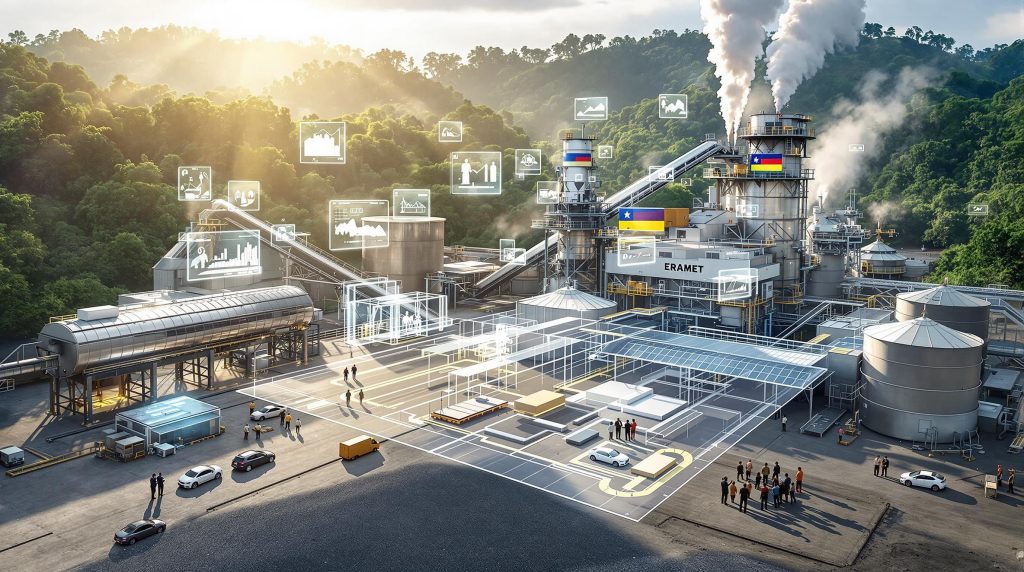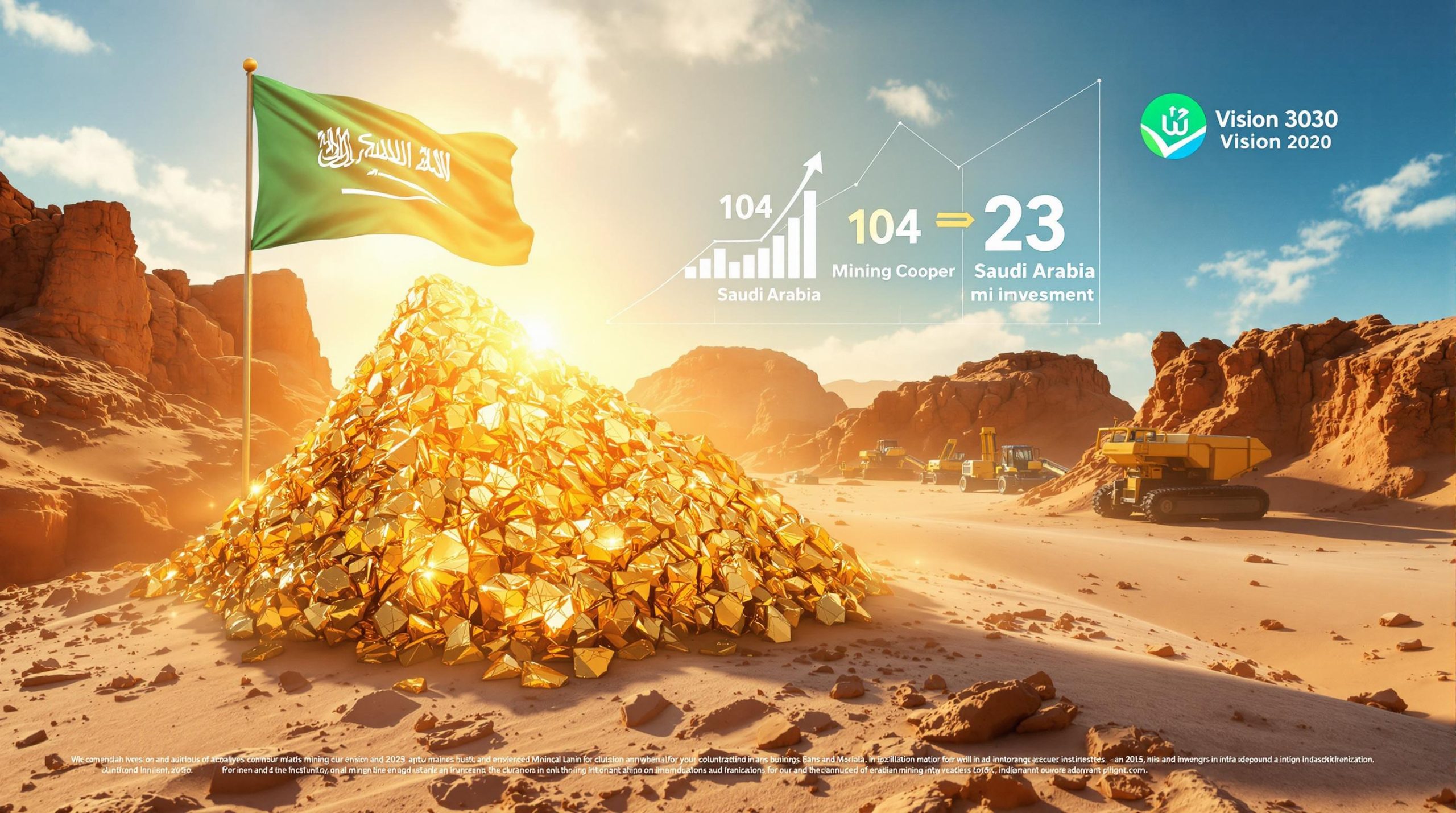Gabon's Manganese Strategy: Industry Transformation through Local Processing
Gabon's government has made a bold move in its resource management strategy, announcing a ban on raw manganese exports beginning January 2029. This decisive policy shift, revealed in late May, represents a significant pivot in how the Central African nation plans to leverage its considerable mineral wealth, particularly its rich manganese deposits that rank among the world's most valuable.
Understanding Gabon's Manganese Export Ban
The Gabonese government's decision to ban unrefined manganese exports by January 2029 signals a fundamental shift in the country's resource management approach. This strategic move aims to capture greater economic value from the nation's natural resources by requiring local processing before export.
This policy follows similar initiatives across West Africa, where resource-rich nations are increasingly seeking to maximize economic benefits from their mineral beneficiation insights. By mandating local processing, Gabon hopes to create a more robust industrial base, generate higher-value exports, and create skilled employment opportunities.
The nearly six-year implementation timeline gives mining operators sufficient runway to adapt their operations and develop the necessary processing infrastructure. This gradual approach demonstrates Gabon's recognition of the substantial investments and technical adjustments required for successful implementation.
Eramet's Strategic Response to Gabon's New Requirements
In a direct response to Gabon's policy announcement, French mining giant Eramet has appointed Clement Jakymiw as director of value chain transformation in Gabon. This appointment, reporting directly to CEO Paulo Castellari, demonstrates the company's commitment to adapting to the new regulatory framework.
Jakymiw brings valuable operational experience to this role, having previously served as deputy chief operating officer in charge of manganese ore. His appointment represents a strategic elevation of Gabon operations to executive-level priority within the Eramet corporate structure.
Eramet's CEO Paulo Castellari has personally engaged with Gabonese President Brice Oligui Nguema following the export ban announcement, highlighting the significance of this policy shift. In a statement, Castellari noted that Jakymiw's appointment "echoes the country's ambition for industrialization and local processing and is part of the longstanding partnership that has united Eramet with Gabon, the Group's historic home for nearly thirty years."
This high-level engagement demonstrates the critical importance of Gabonese operations to Eramet's global business strategy and suggests a collaborative approach to meeting the new processing requirements.
Eramet's Established Presence in Gabon's Manganese Sector
Eramet has maintained operations in Gabon for nearly three decades, establishing itself as the dominant player in the country's manganese industry. The company primarily operates through its subsidiary Comilog, which manages extraction and processing operations.
The Gabonese government maintains a minority stake in Comilog, creating a partnership structure that aligns public and private interests. This existing relationship provides a foundation for cooperation as both parties navigate the transition toward increased local processing capacity.
Currently, Comilog processes some manganese locally but exports the majority as raw ore. The shift toward complete local processing represents a fundamental transformation of the company's operational model in Gabon.
Gabon's manganese deposits are recognized for their exceptional quality and strategic importance to global steel production. As both a significant manganese producer and oil exporter, Gabon's economic interests are closely tied to responsible resource development and value addition.
Transformational Potential for Gabon's Manganese Industry
The export ban creates powerful incentives for developing comprehensive manganese processing infrastructure within Gabon's borders. This transition will require substantial investments in physical infrastructure, technology acquisition, and workforce development.
Local processing capabilities can potentially diversify Gabon's manganese product portfolio beyond raw ore, creating opportunities to produce higher-value products such as manganese alloys, electrolytic manganese dioxide, and specialized chemical compounds. This product diversification could significantly enhance export values while reducing vulnerability to raw commodity price fluctuations.
The development of processing facilities will likely create new employment opportunities requiring specialized skills, potentially stimulating education and training programs. This skills development aspect represents a crucial element of the policy's intended economic benefits.
Processing infrastructure development may also stimulate growth in supporting industries and services, creating an economic multiplier effect that extends benefits beyond the direct mining sector. This broader economic impact represents a key objective of Gabon's industrial development strategy.
Global Market Implications of Gabon's Processing Requirements
Gabon's policy shift occurs within a global context where resource-rich nations increasingly seek greater economic benefits from their natural resources. This trend toward "resource nationalism" presents both challenges and opportunities for multinational mining companies and metal consumers.
For steel manufacturers and other manganese consumers, the transition period may create uncertainty regarding supply continuity and pricing. However, the extended implementation timeline provides an opportunity for market adaptation and supply chain adjustments.
The processing requirements may ultimately influence global manganese pricing structures, potentially creating premium markets for processed manganese products while affecting raw ore pricing dynamics. These market adjustments will likely evolve gradually as Gabon's processing capacity expands.
The policy may also establish precedents for other manganese-producing nations considering similar value-addition requirements. This potential domino effect could accelerate the global trend toward increased mining industry evolution across resource-rich regions.
Technical and Economic Challenges in the Transition
Developing sufficient processing capacity to handle Gabon's manganese output presents significant technical challenges. Selecting appropriate processing technologies, securing reliable energy supplies, and managing environmental impacts represent critical considerations for successful implementation.
Processing facilities require substantial capital investments, specialized equipment, and technical expertise. Developing this infrastructure within the implementation timeline will require accelerated planning and execution from both private operators and government agencies.
Energy requirements for manganese processing are considerable, necessitating reliable and affordable power supplies. Gabon's energy infrastructure development will play a crucial role in determining the economic viability of expanded processing operations.
Water management and environmental controls represent additional technical challenges, as processing operations typically generate effluents and emissions requiring proper management. Developing appropriate sustainability transformation strategies will be essential for long-term operational viability.
The economic viability of processed manganese products from Gabon will ultimately depend on global market conditions, production costs, and product quality. Ensuring competitive positioning in international markets will require careful attention to operational efficiency and product specifications.
Understanding Manganese's Strategic Importance
Manganese plays an essential role in modern industrial economies, with approximately 90% of global production used in steel manufacturing. As an alloying element, it improves steel's strength, hardness, and resistance to abrasion, making it indispensable for construction, automotive, and machinery applications.
Beyond steel production, manganese has emerging applications in battery technologies, particularly for electric vehicles. Lithium-manganese oxide and nickel-manganese-cobalt chemistries represent growing markets as global transportation electrification accelerates.
Supply security concerns have elevated manganese's strategic profile, as production is concentrated in relatively few countries. This concentration creates potential supply vulnerabilities for consuming nations, particularly as demand grows for both traditional and emerging applications.
Market projections indicate steady growth in manganese demand, driven by infrastructure development in emerging economies and increased battery materials requirements. This growth trajectory supports Gabon's strategic emphasis on capturing greater value from its manganese resources.
Comparative Analysis: Resource Development Approaches
Gabon's approach shares similarities with policies implemented in other resource-rich African nations, including Indonesia's restrictions on unprocessed nickel exports and the Democratic Republic of Congo's efforts to develop local cobalt processing. These parallels suggest a broader continental shift toward resource beneficiation.
Unlike some more abrupt implementation timelines seen elsewhere, Gabon's nearly six-year transition period provides a more measured approach. This extended timeline may improve the likelihood of successful implementation while reducing market disruptions.
The policy appears to include clear deadlines but may allow flexibility in implementation details. This balanced approach could facilitate constructive dialogue between government agencies and mining operators during the transition period.
Environmental Considerations in Local Processing
Manganese processing operations typically generate wastewater, emissions, and solid waste requiring proper management. Developing appropriate environmental controls represents an essential component of sustainable processing operations.
Gabon's environmental regulatory framework will need to evolve alongside processing capacity development. Clear standards, monitoring requirements, and enforcement mechanisms will be crucial for ensuring responsible operations.
International certification standards and responsible sourcing initiatives may provide frameworks for environmental management. Adopting recognized standards could enhance market acceptance of Gabon's processed manganese products while ensuring decarbonisation benefits are realized throughout the value chain.
Key Stakeholders in Gabon's Manganese Sector
| Entity | Role | Strategic Position |
|---|---|---|
| Gabonese Government | Resource owner and regulator | Driving industrialization and seeking increased economic value |
| Eramet/Comilog | Primary operator | Adapting operations to meet new processing requirements |
| President Brice Oligui Nguema | National leadership | Advancing resource development agenda |
| Steel manufacturers | End users | Monitoring supply chain reliability and costs |
| Local communities | Affected stakeholders | Potential beneficiaries of expanded economic activity |
Critical Success Factors for Gabon's Processing Vision
Successfully implementing Gabon's processing vision will require coordinated effort across multiple dimensions:
- Infrastructure development: Beyond processing facilities, supporting infrastructure including reliable power, water, and transportation networks will be essential
- Technical capability building: Developing local expertise through training programs and knowledge transfer initiatives
- Investment mobilization: Attracting sufficient capital to fund processing infrastructure development
- Environmental safeguards: Implementing effective controls to manage processing impacts
- Regulatory clarity: Providing consistent policy guidance and enforcement throughout the transition
The implementation timeline provides a critical window for addressing these factors, with early progress indicators likely emerging in the next 2-3 years as operators begin adapting their strategic plans.
Moving Forward: The Path to Processing Self-Sufficiency
Gabon's manganese processing initiative represents a significant economic development opportunity that extends beyond simple resource extraction. By moving up the value chain, the country positions itself to capture greater economic benefits while developing industrial capabilities.
For Eramet and other operators, the transition presents both challenges and opportunities. While requiring substantial investments and operational adjustments, local processing could potentially reduce transportation costs and create new product opportunities.
The six-year implementation window provides time for thoughtful planning and phased development. This measured approach increases the likelihood of successful implementation while allowing market participants to adapt gradually.
As Gabon advances toward its processing objectives, monitoring progress indicators including infrastructure development, investment commitments, and mine reclamation innovation will be critical to ensuring the long-term sustainability of the country's mining industry evolution, as noted by Global Banking & Finance Review.
Looking for Investment Opportunities in Emerging Mineral Markets?
Discovery Alert's proprietary Discovery IQ model provides real-time notifications on significant ASX mineral discoveries, transforming complex industry developments into actionable investment insights. Explore how major mineral discoveries can lead to substantial returns by visiting Discovery Alert's dedicated discoveries page and position yourself ahead of the market.




